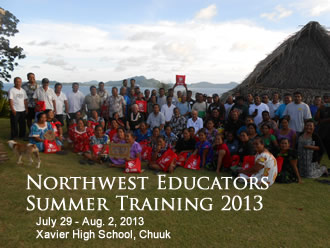I’ve just returned from a week at Xavier High School in Chuuk, site of my first teaching years, to co-facilitate the Northwest Educators Summer Training (NEST) for over 70 public school teachers and principals and leaders from the poor and geographically remote Northwest Unified Schools. While the NEST was funded largely by the Chuuk State Department of Education (CDOE), this first-ever community led regional training was the first in Chuuk that was wholly planned and implemented by a region rather than by the Department of Education.
The sense of ownership of educational reform for that region was evident throughout the week in all the discussions. This spirit of community ownership of reform began a year ago when CDOE gathered the Northwest educators and leaders at Northwest High School (then, Weipat) to challenge them to take full ownership of educational reform in the region as part of the Chuuk Education Reform Plan (CERP). That challenge by Deputy Director Noha Ruben was met with enthusiasm by the Northwest leadership and educators and they proceeded to plan the first NEST to be held at Xavier High School.
NEST was truly a regional effort from planning, funding, to implementation. All the Northwest Unified Schools principals agreed to pool their school-based budgets on training to fund the NEST, agreed to a regional academic calendar to ensure that all schools end in time for the NEST, and all participants traveled on their own time and money to Weno to participate in the NEST. Even our newly elected political leaders in the Chuuk State Legislatures (Senators Matt Kuor and Atan Hetiback and Representatives Andrew May and Celes Kaliga) followed suit and united to participate in all the NEST sessions and then proceeded to host a huge closing dinner celebrations on the last day to honor the NEST participants.
All in all the NEST was a successful start of unifying educators, municipal, church and traditional leaders, parents, elected officials, the Northwest citizens overseas, and funders like Fanapi Foundation, Matsen Foundation, CDOE, and the Office of Insular Affairs (OIA)…to support educational reform in the region and the State of Chuuk. The nest and the traditional mat were used throughout the week to symbolize this weaving together of many community strands to form a supportive environment of growth for the children of the Northwest region.
During a leadership summit between the educators and the Northwest leaders (mayors, chiefs, senators, representatives), the NEST trainers (Fr. Arthur Leger, SJ, Ph.D., Margarita Cholymay, Ph.D, Paulina Yourupi, M.A., and Vidalino Raatior, M.A.) who have been asked to serve as the Northwest Consulting Team (see #9) summed up the week’s worth of discussions into the following 10 strands which were ratified as the 10 priorities for the Northwest Unified Schools.
1) LOCAL CULTURES: There is real energy for the local traditional cultures to be integrated into the Northwest Unified Schools student learning.
2) CODE OF ETHICS: There is general acceptance that there is to be a common code of ethics for Northwest Unified Schools for the principals, teachers, community, and the students. This code of ethics will be expressed in our pledge.
3) MISSION & VISION: There is real hope that a common mission and vision might be developed for the Northwest Unified Schools.
4) SCHOOL IMPROVEMENT PLAN: That the Northwest Unified Schools’ principals and teachers know how to develop and implement the School Improvement Plan. This will be closely linked to our Academic Calendar for the Northwest Unified Schools.
5) STRATEGIC PLAN: That a Northwest Unified Schools Strategic Plan to be developed for curriculum awareness and implementation especially school-based lesson planning.
6) ANALYZING ASSESSMENT: That principals and teachers seek further assistance in developing, administering a Northwest Unified Schools standardized test and analyzing the JHET and NST.
7) LOCAL LEADERSHIP: That a local leadership team to be formed in the Northwest Unified Schools to assist in the coordination and implementation of a Northwest Unified Schools Strategic Plan, particularly the Code of Ethics, the integration of culture life skill into the curriculum, and the understating of alignment of the curriculum to instruction and assessment.
8) NEST REPORT: That the Northwest Consulting Team creates a report on NEST, based on the attainment of the objectives, which will be disseminated to stakeholders including Office of Insular Affairs, the CDOE, leaders and funders.
9) NORTHWEST CONSULTANTS: That there is still much work to do and the Northwest consultants are willing to help as long as the Northwest Unified Schools educators and leadership requests for our assistance in areas that may not be provided by CDOE.
10) COMMITMENT: That we can continue to keep this energy and commitment to improvement of student learning in the Northwest, only if the leaders and the those involved in education work together for the sake of the students.







